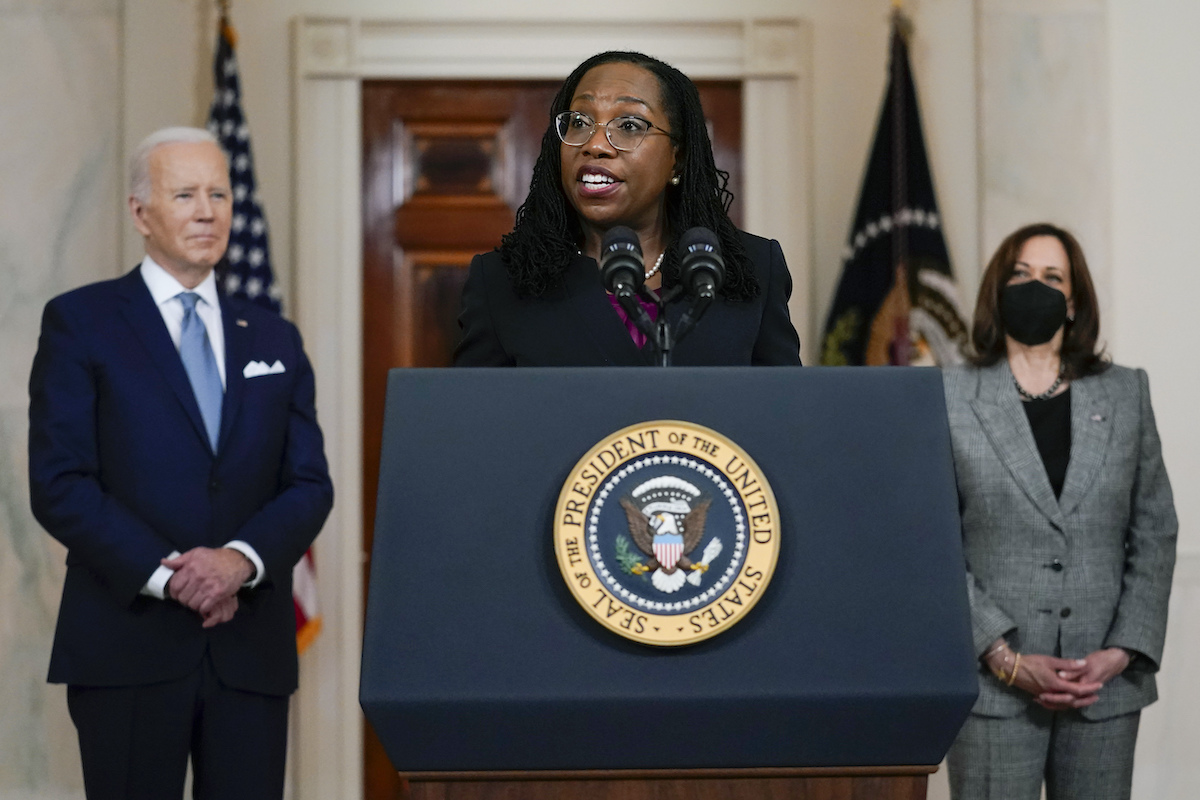There is almost no institution in the past 100 years that has more profoundly shaped American public life than the Supreme Court. As a result, the composition of the Supreme Court has become one of the most prominent issues in every campaign season—whether it is the presidential election cycle or the midterm congressional elections. Since at least the mid-1980s, the nomination of a potential justice has been a political event with the most potential to ignite explosive partisan conflict given that the stakes are so high. Judge Ketanji Brown Jackson, nominated by President Biden to replace retiring Justice Stephen Breyer, now finds herself right in the center of that storm.
It would likely be perplexing to the Founding Fathers that the composition of the Supreme Court has evolved to become one of the nation’s most contentious political issues. The “least dangerous branch” can take no independent initiative to act in any meaningful way. The Court’s power is largely dependent upon being invited into “cases and controvers[sies]” either by private parties or those acting on behalf of the other branches of government. So why is Judge Jackson’s nomination and potential confirmation so important? Should it be? And what are the implications for liberty if she takes a seat on the Supreme Court?
One of the few Supreme Court decisions unrelated to civil liberties that makes its way into almost every civics textbook is the 1803 decision Marbury v. Madison. In finding that an act of Congress was incompatible with the U.S. Constitution, the Court articulated for the first time the doctrine of judicial review. Today this doctrine is the basis of the power of the courts to determine whether laws are constitutional or unconstitutional—essentially whether they are consistent with or in conflict with the Constitution.
The Marbury Court’s decision was uncontroversial and largely unnoticed at the time. This is probably an indicator of the stature and role of the Court as that generation understood it. But it should have been controversial. The articulation of the doctrine is a departure from and abandonment of the common law doctrine known as “judicial duty,” which had governed the role of judges and informed their understanding of the hierarchy of laws for generations. Marbury represents the first step down a path that has led to the rise of our laws being arbitrary and situational rather than metaphysically grounded and principled.
The doctrine of judicial duty is, quite simply, the duty of judges to make decisions in accordance with the law. The doctrine is deceptively simple and seems obvious. But what is meant by “law” can elicit significant debate. The differences between judicial duty and judicial review, too, may seem pedantic. They are admittedly subtle, but important things are often subtle.
Both doctrines assume that law exists in a hierarchy, but judicial review only considers posited law. The U.S. Constitution, according to Marbury, is superior to the act that the Court found to be unconstitutional. Judicial duty is, as the name makes clear, a duty incumbent upon judges. And in the context of the writing and ratification of the Constitution, the most superior law was not understood to be posited. Law that is customary and born of common sense and natural reason was considered superior to any posited source of law. Some critics argue that accepting this definition of law and hierarchy of laws opens the door to the assertion of claims that are religious rather than legal. And there is a view of the natural sources of law that is explicitly informed by religion. But the doctrine of judicial review ultimately forecloses the possibility of considering the compatibility of law with natural sources of law regardless of the specific source and arbitrarily identifies the Constitution as the starting point for all legal reasoning and judicial decisions. It should be noted that the Constitution does, in fact, discuss the hierarchy of law, but only in the context of the relationship of federal and state law. It never explicitly identifies the written, posited law as the exclusive source of law or the starting point for all legal reasoning.
In the context of a society with the rule of law, the doctrine of judicial review probably seems just fine. But consider for a moment, however, corrupt systems in which judges make decisions for political reasons or because they have accepted bribes. Most would consider this unjust. But what if the national constitution in which such a system exists allows for this? The judges who accept bribes or make decisions in order to curry political favor would do so under the color of law. Their decisions on these bases would be constitutional. But instinctively we all know that this is not just, even if legal in the strictest sense. This type of judicial behavior is not just even in the face of posited law that permits it, because it runs counter to the natural sources of law that inform our sense of justice.
An Unimagined Power
So what does this have to do with Judge Ketanji Brown Jackson? It means that if she is confirmed, she and the other eight justices will have far more unrestrained power to shape our society than our Framers ever imagined. In practical terms it does matter how she understands the law, interprets statutes, and conceives the role of the state in the lives of private citizens.
Before joining the bench, Judge Jackson worked openly for progressive causes and is not, as at least one commentator has labeled her, apolitical. But more importantly, Judge Jackson has served on two unique federal courts. Her eight-year tenure as a district court judge and months-long tenure as an appellate judge has been in jurisdictions that normally hear specialized types of cases that do not afford judges opportunities to entertain broad questions of law. In fact, in response to questioning about her philosophy of constitutional interpretation during her last confirmation, she surprisingly, but honestly, replied, “I have not had any cases that have required me to develop a view on constitutional interpretation of text in the way that the Supreme Court has to do and has to have thought about the tools of interpretation.” It is hard to see how her few months as an appellate judge and her publication of just two appellate decisions since July 2021 has remedied that.
But there is a case that stands out from her time as a trial judge that provides a window into her attitude about the role of the courts in the American system. Judge Jackson was quite willing to lean on the doctrine of judicial review to an extreme and radical extent in subjecting Trump-era immigration policy to judicial review even in the face of a statutory provision that granted “sole and unreviewable discretion” to the executive branch. An Obama appointee on the appellate panel that reversed her wrote, “there could hardly be a more definitive expression of congressional intent to leave the decision about the scope of expedited removal, within statutory bounds, to the Secretary’s independent judgment.” Jackson’s was a blatant example of judicial activism recognizable even to a judge that likely shares many of her ideological and political sympathies.
Two aspects of Judge Jackson’s background that should be of some comfort to those who value liberty include two unique things. First, if she were to join the Court, she would be the first justice in more than a generation to have presided over a trial that included a jury, which is a unique institution critical to American democracy. Second, having served as a public defender, she would be the only current justice who had spent any portion of her career defending citizens against the state rather than representing the state and its interests. There is no question that we need more judges at all levels of the judiciary with such experience.
Ultimately, however, Judge Jackson’s confirmation would almost certainly prove problematic for the causes of preserving individual liberty and stemming the tide of encroaching government involvement in the lives of ordinary citizens. She’s demonstrated a willingness to exert judicial power beyond its already strained boundaries. The bigger problem that lovers of liberty should wrestle with, however, is that her confirmation matters to any substantive extent given that the courts following Marbury have far exceeded their place in American government and public life and proven not to be, as they were once described, the “least dangerous branch.”

